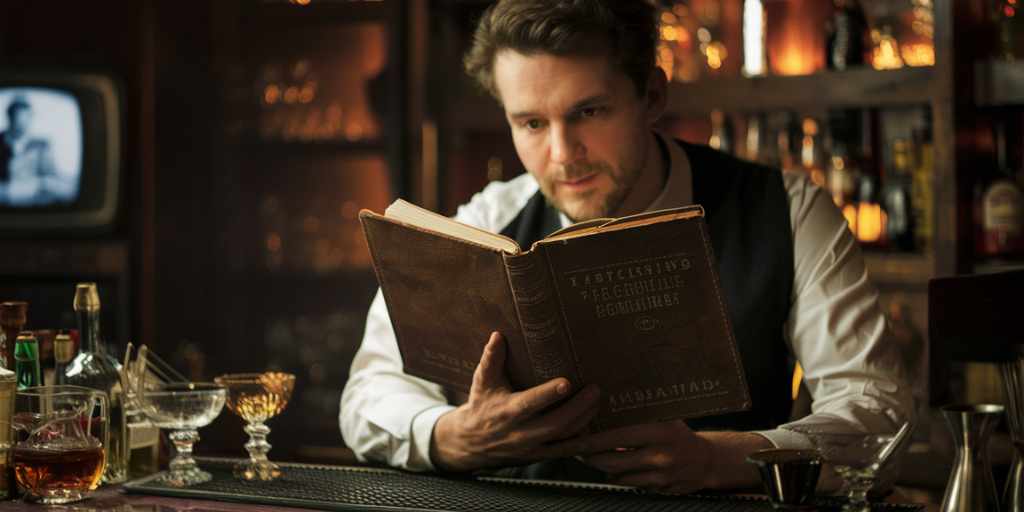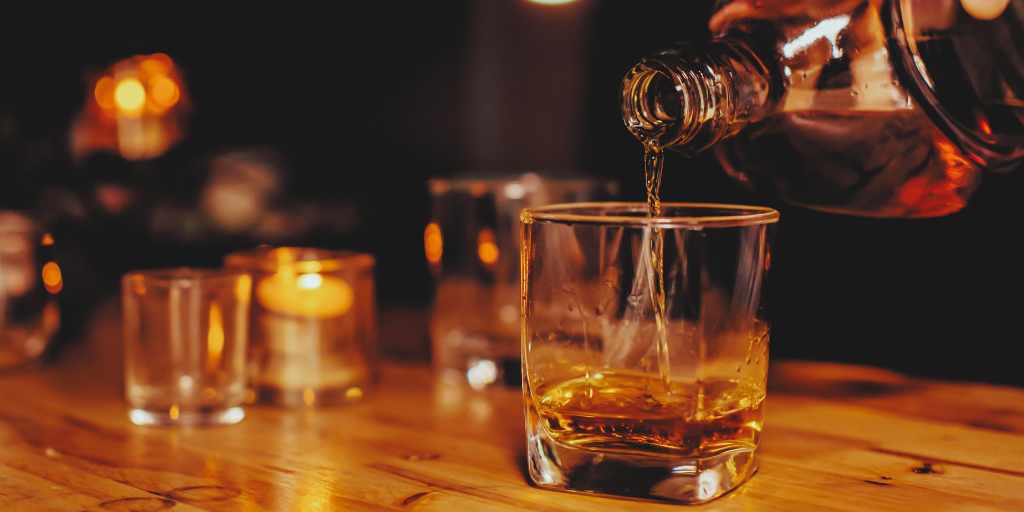In the bustling food and beverage world, crafting the perfect cocktail is a revered skill, and the bartender’s book is essential to this craft. These comprehensive guides offer a wealth of knowledge, from mixology techniques to classic and contemporary cocktail recipes. They serve as indispensable tools for novice and experienced bartenders keen on elevating their mastery of drink-making. Moreover, bartender books often delve into the history and storytelling behind iconic drinks, providing a richer understanding and appreciation of the cocktail culture.
Our Top Picks:
Are you in a rush? Here are our top 5 best bartending books:
- Mixology Mastery
- The Bartender’s Manifesto
- The Bartender’s Black Book
- The Ultimate Bar Book
- The Home Bartender: Simplified Elegance
For more information on these books, see the reviews below.
Top Bartending Guides
Our research and experience in mixology have led us to compile a collection of essential bartender books. These guides cover everything from classic cocktail recipes to advanced bartending techniques, offering valuable knowledge for novices and seasoned professionals. Whether you’re looking to polish your home bar skills or master the craft while working at a bustling venue, our selection encompasses the most informative and reliable resources in the bar industry here.
Mixology Mastery
We believe “The Art of Mixology” should find a place on every cocktail lover’s shelf for its educational content and visually appealing presentation.
Pros
- Rich in classic recipes with a modern twist
- High-quality photographs complement the instructions
- Structured and easy to navigate
Cons
- It may not include as many advanced recipes for experienced mixologists
- The hardcover can be less portable for on-the-go referencing
- Emphasis on visuals over in-depth mixology techniques
When you flick through “The Art of Mixology,” you’re met with vibrant colours and clear, concise instructions. The authors have distilled the essence of mixology into something that is not only approachable but thoroughly engaging. The high-quality photographs accompanying each recipe make it a feast for the eyes and inspire you to start mixing immediately.
Our recent use of the book revealed it’s incredibly adept at guiding you through the nuances of cocktail crafting. Whether you’re looking to impress guests or enjoy a well-made drink at home, the book eases the learning curve. Furthermore, navigating through the recipes is a breeze thanks to a well-structured layout that categorizes drinks to suit any occasion.
As we’ve done a deep dive into the art ourselves, we can’t help but notice the focus is more on classic cocktails and not as much on innovative, modern mixology that could challenge the more experienced bartender. Yet, this book is an inviting doorway for novices and intermediate enthusiasts to step into the world of cocktail mixing. Despite the sturdy hardcover being less travel-friendly, it makes for an impressive display on any bar cart or coffee table, symbolizing a commitment to craft cocktails.
The Ultimate Bar Book
This cocktail guide is essential for novice and experienced bartenders looking for a comprehensive recipe reference.
Pros
- A rich collection of over 1,000 cocktail recipes
- Organized and concise, making it practical for use behind the bar
- Durable and visually appealing design
Cons
- Lacks illustrations which could enhance the learning experience
- Some cocktails are less known, possibly overwhelming for beginners
- It may not fit into smaller bookshelves due to its size
This book is reminiscent of having a wise mentor with you in the kitchen or behind the bar. The wealth of cocktail recipes is staggering, and it has become a trusty ally whenever we’re exploring new concoctions or perfecting the classics. The text is laid out in a manner that’s easy to understand guide navigate; whether you’re looking for a drink by name or the primary liquor, you’ll find what you need in a snap.
The construction of this book is noteworthy — it feels robust and is certainly built to withstand the spills and thrills of cocktail party and crafting. After months of use, the binding holds strong, and the hardcover continues to ward off wear and tear, which is more than we can say for some other references that have crossed our path.
Despite its many strengths, if you’re the type that appreciates visual guidance, the absence of images might dampen your enthusiasm. However, what it lacks in visuals is clear, easy-to-follow instructions that allow us to shake up some delightful beverages.
All in all, ‘The Ultimate Bar Book’ exudes confidence. It doesn’t just sit on our shelf; it’s a tool we use regularly. For those looking to elevate their mixology skills or want a reliable recipe book, this is an investment worth toasting.
The Home Bartender: Simplified Elegance
If you’re keen on mastering the art of mixology and original cocktails with minimal ingredients, this guide is an essential addition to your collection.
Pros
- The user-friendly layout makes it perfect for beginners.
- Compact size for easy reference behind the bar.
- Rich visuals aid in the crafting of each cocktail.
Cons
- There are only four ingredient recipes, which may not cater to all palates.
- Hardcover may not be as durable as expected in a busy bar environment.
- Some users may find the drink selection too conventional.
Crafting cocktails felt like a breeze with “The Home Bartender.” The layout is intuitive, showing that beginners and seasoned mixologists alike can appreciate the simplicity of making cocktails with the four-ingredient limit. Thanks to the vibrant visuals, each cocktail comes to life on the page, making it irresistible not to try your hand at mixology.
It’s more than just a recipe collection of good drinks; it’s a guide that encourages exploration within the constraints of simplicity. The book wisely avoids overwhelming users with complicated concoctions, which is perfect for those moments when you seek a quick yet tasteful drink to impress.
However, it’s not without shortcomings. Although the hardcover gives it a premium feel, it might not withstand constant use in a bustling bar environment. Additionally, the recipes might feel too familiar after a while, especially if you’re adventurous and looking to expand beyond the basics. But no matter what, “The Home Bartender” is an excellent starting point for anyone looking to dip their toes into home mixology.
The Bartender’s Black Book
Thanks to its extensive cocktail recipes and practical design, this guide is essential for anyone aspiring to elevate their bartending skills.
Pros
- A comprehensive collection of over 2,500 recipes
- Quality materials and attractive styling
- It is an ideal gift for cocktail enthusiasts
Cons
- The small print may be challenging to read for some
- Size may be larger than expected for portability
- Orientation towards beginners may not appeal to experienced bartenders
Have you ever found yourself eager to mix a new cocktail but unsure where to start? ‘The Bartender’s Black Book’ has been our go-to cocktail reference ever. The breadth of recipes available at your fingertips lets us quickly whip up classic drinks and confidently explore new concoctions.
We’ve noticed that gifting this book has never been a miss, especially for friends just starting to explore the world of mixology. Moreover, the construction is durable, and the design is elegant, making it not just a functional tool but also a lovely countertop piece.
However, some might find the font size to be a slight hurdle. Squinting while deciphering cocktail components isn’t ideal, especially in a dimly lit setting. Additionally, as much as it’s packed with valuable information, the book’s size can make it less convenient for those who need something on the go.
Our experience with ‘The Bartender’s Black Book’ has been positive. It encourages beginners to broaden their horizons and is a reliable, quick reference for the more seasoned mixer. It’s become a staple in our collection, one we often reach for when the occasion calls for a well-crafted drink.
The Bartender’s Manifesto
Thanks to its insightful and practical approach to cocktail technique, we think this guide is a crucial tool for anyone serious about mastering the craft of cocktail creation.
Pros
- Offers in-depth knowledge to elevate cocktail-making skills
- The engaging and humorous writing style
- Visually pleasing layout, aiding in recipe comprehension
Cons
- Some recipes might have hard-to-find ingredients
- Heavier book, not as portable as some may prefer
- Reported cases of damage in shipping, affecting gift presentation
Having recently gone through “The Bartender’s Manifesto,” I’m struck by the depth it offers. The book transcends mere recipes, diving into the philosophy and creativity behind a bartending career. It’s as if my approach to mixing drinks was utterly transformed after just a few chapters. The author’s expertise shines, equipping me with the confidence to experiment with flavours and techniques.
The witty anecdotes scattered throughout made the reading experience enjoyable, quite different from the dry instruction typical of technical guides. It’s not just helpful—it’s a pleasure to read. With every page turn, I found fresh inspiration, which translated directly into the drinks I served, much to my guests’ delight.
An issue I noticed, however, was the reliance on some exotic ingredients that my local stores don’t always stock. I had to plan to ensure I had everything, which sometimes meant putting a cocktail on hold. Also, while impressively comprehensive, the book is a bit bulky—certainly not something I’d carry around casually.
Despite these small hurdles, “The Bartender’s Manifesto” has been an invaluable addition to my bartending book library. It’s helped me craft memorable experiences for myself and my guests, reinforcing my belief that a great drink is more than the sum of its parts—a story told in sips.
…And Even More Bartending Books
We wanted to keep this list short, but here are some other bartending books you might want to add to your shelf.
- “The Bartender’s Bible” and “The Joy of Mixology” – two classics by Gary Regan
- “The Savoy Cocktail Book” by Harry Craddock and “PDT Cocktail Book” by Jim Meehan for classic cocktails. Also, “Imbibe!” by David Wondrich is a classic on the history of cocktails.
- “The 12 Bottle Bar”, “Death & Co: Modern Classic Cocktails” by David and Lesley Jacobs Solmonson, and “The Craft of the Cocktail” by Dale Degroff have more contemporary approaches to cocktails with detailed recipes.
- “Meehan’s Bartender Manual” by mixologist Jim Meehan. The book covers everything from cocktail recipes to bar management techniques.
- “The Bar Book” by Jeffrey Morgenthaler for technique-driven guidance from bar tools to proper techniques for mixing drinks.
- The “Cocktail Codex“, by the founders of cocktail bar Death & Co, is a cocktail recipe book with a twist. Instead of just giving recipes, it breaks down cocktails into 6 foundational types (“root recipes”) and teaches you the core principles of mixology so you can create your own drinks.
- Finally, to master mixology, pick up “Liquid Intelligence” by Dave Arnold and “The Flavor Bible” by Karen Page and Andrew Dornenburg, which is invaluable for understanding flavour pairings.
Buying Guide
Assessing Your Needs
In choosing the best bartender book, we first consider our needs. Are we beginners seeking to learn the basics, or are we experienced mixologists looking to expand our repertoire? Understanding this guides our selection towards either an introductory guide or a more comprehensive resource.
Content Quality
We look for books offering clear, concise recipes and techniques. It’s essential to find a source that balances detail with understandability. The content should be well-organized, allowing us to navigate cocktails, mixing methods, and barware sections easily.
Durability and Design
A bartender’s book is often used in a working bar environment, so durability matters. We prefer books with sturdy bindings and quality paper that can withstand frequent use. Additionally, a well-designed layout with high-contrast text and imagery aids in readability under varied lighting conditions.
Features Comparison
We use the following table to compare key features without referring to specific brands:
| Feature | Importance | Notes |
|---|---|---|
| Ingredient Guide | High | Inclusion of a comprehensive list of ingredients and their uses. |
| Techniques | Medium | Coverage of essential mixing, shaking, and serving techniques. |
| Recipe Variety | Medium | A broad selection of drink recipes, from classics to contemporary. |
| Indexing | High | Quick reference to recipes and topics for efficient lookup. |
By assessing these core features, we ensure our choice of bartender book functions as a practical tool and a source of inspiration, catering to our current skills and aspirations in mixology.
Frequently Asked Questions

What essential books should every beginner bartender own?
As beginners, we recommend “The Bartender’s Bible” by renowned bartender Gary Regan and “The Joy of Mixology” by the same author. These provide robust foundations in cocktail preparation and the principles of bartending.
Which cocktail recipe books are considered classics in the bartending world?
Classics in our industry include “The Savoy Cocktail Book” by Harry Craddock and “PDT Cocktail Book” by Jim Meehan. Both these cocktail books are rich with time-honoured recipes and have influenced many professional bartenders.
What are the most recommended bartending guidebooks for home enthusiasts?
For home enthusiasts, we suggest “The 12 Bottle Bar” by David Solmonson and Lesley Jacobs Solmonson, which shows you how to do a lot with a little, and “Death & Co: Modern Classic Cocktails” for a more contemporary approach with detailed recipes.
Can you recommend comprehensive literature for mastering mixology?
To master mixology, we advise getting “Liquid Intelligence” by Dave Arnold for its scientific perspective and “The Flavor Bible” by Karen Page and Andrew Dornenburg, which is invaluable for understanding flavour pairings.
What are the top-rated instructional books for aspiring professional bartenders?
Aspiring professionals should seek “The Bar Book” by Jeffrey Morgenthaler for technique-driven guidance and “Meehan’s Bartender Manual” to thoroughly examine the craft’s practical and theoretical aspects.
Where can one find authoritative resources on the history and art of bartending?
For authoritative resources on the history and art of bartending, “Imbibe!” by David Wondrich is an excellent narrative on cocktail history. At the same time, “The Craft of the Cocktail” by Dale Degroff offers insights into the artistry behind bartending in the modern bar industry.




